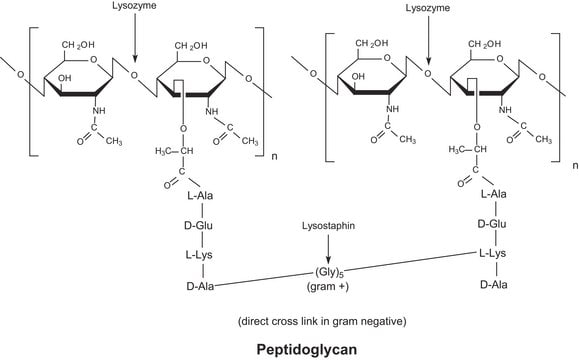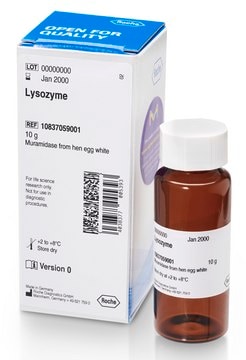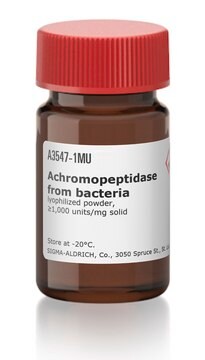L7651
Lysozyme from chicken egg white
lyophilized powder, protein ≥90 %, ≥40,000 units/mg protein, for molecular biology
Synonym(s):
Mucopeptide N-acetylmuramoylhydrolase, Muramidase
About This Item
Recommended Products
grade
for molecular biology
form
lyophilized powder
specific activity
≥40,000 units/mg protein
mol wt
single-chain 14.3 kDa
composition
protein, ≥90%
UniProt accession no.
storage temp.
−20°C
Gene Information
chicken ... LYZ(396218)
Looking for similar products? Visit Product Comparison Guide
Application
Biochem/physiol Actions
The enzyme is active over a broad pH range (6.0 to 9.0). At pH 6.2, maximal activity is observed over a wider range of ionic strengths (0.02 to 0.100 M) than at pH 9.2 (0.01 to 0.06 M).
Features and Benefits
- Highly purified by repeated crystallization and dialysis
- Each lot is use-tested for isolation of plasmid DNA from E. coli
Unit Definition
Physical form
Preparation Note
replaced by
Signal Word
Danger
Hazard Statements
Precautionary Statements
Hazard Classifications
Resp. Sens. 1
Storage Class Code
11 - Combustible Solids
WGK
WGK 3
Flash Point(F)
Not applicable
Flash Point(C)
Not applicable
Personal Protective Equipment
Choose from one of the most recent versions:
Already Own This Product?
Find documentation for the products that you have recently purchased in the Document Library.
Customers Also Viewed
Which document(s) contains shelf-life or expiration date information for a given product?
If available for a given product, the recommended re-test date or the expiration date can be found on the Certificate of Analysis.
How do I get lot-specific information or a Certificate of Analysis?
The lot specific COA document can be found by entering the lot number above under the "Documents" section.
How can I reconstitute Lysozyme from chicken egg white, Product L7651?
For E. coli cell lysis, use a freshly prepared lysozyme solution (10 mg/mL) in 10 mM Tris-HCl, pH 8.0. The product is also soluble in water (10 mg/mL) yielding a clear to slightly hazy colorless solution.
How stable are solutions of Lysozyme from chicken egg white, Product L7651?
Aqueous solutions should retain activity for at least one month when stored between 2-8 °C.
Is Lysozyme from chicken egg white, Product L7651, suitable for bacterial lysis prior to DNA purification?
Each lot is verified to be suitable for use as a lysing agent in purifying plasmid DNA from E. coli. You can also use this product in combination with the GenElute™ Bacterial Genomic DNA Kit (Product No. NA2100) to purify genomic DNA from Gram-positive bacteria.
How do I find price and availability?
There are several ways to find pricing and availability for our products. Once you log onto our website, you will find the price and availability displayed on the product detail page. You can contact any of our Customer Sales and Service offices to receive a quote. USA customers: 1-800-325-3010 or view local office numbers.
What is the Department of Transportation shipping information for this product?
Transportation information can be found in Section 14 of the product's (M)SDS.To access the shipping information for this material, use the link on the product detail page for the product.
My question is not addressed here, how can I contact Technical Service for assistance?
Ask a Scientist here.
Our team of scientists has experience in all areas of research including Life Science, Material Science, Chemical Synthesis, Chromatography, Analytical and many others.
Contact Technical Service










